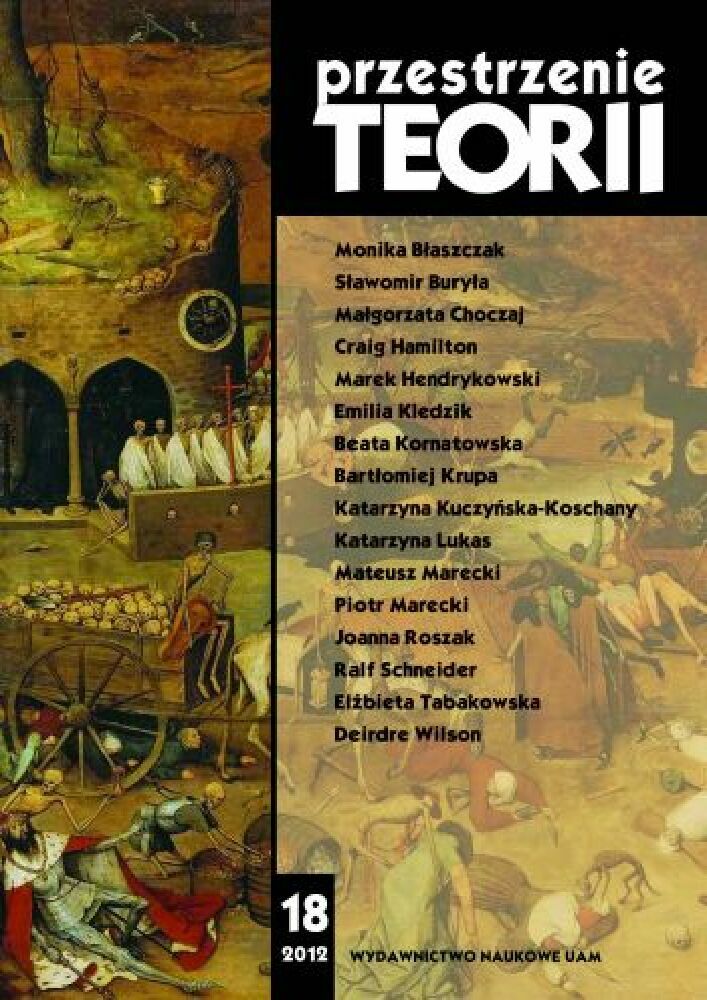Abstrakt
Dust, powder, ash – the categories of description of everything associated with passing and evanescence, forgetfulness, finitude, of elimination of time, new, contemporary, but also a reference to a rebirth, purification, reminders. Although dust is the most important, powder dominates. Rebirth is usually only an attempt, ending in failure. Playwrights, poets, writers are trying to put into words the eternal correctness and inalienable truth that says, from dust you are and to dust you shall return. Destruction, decay and old age, destruction and plunge into nothingness is best described as a man as a “miserable dust.” The heroes try to fight the burning of which begins at birth, but the course of this river cannot be reversedBibliografia
Księga Rodzaju 3: 19. Biblia Tysiąclecia. Pismo Święte Starego i Nowego Testamentu, Poznań 2012.
A. Mickiewicz, Dziady cz. III, Warszawa 1955.
Ks. J. Twardowski, Popielec, [w:] tenże, Kilka myśli na Wielkanoc, Poznań 2010.
A. Krajewska, „Estetyka antybinarna”, maszynopis.
A. Libera, Samuel Beckett, „Tygodnik Powszechny” 1990, nr 2.
G.W.F. Hegel, Fenomenologia ducha, przeł. Ś.F. Nowicki, Warszawa 2002.
L. Feuerbach, Wybór pism, t. 1: Myśli o śmierci i nieśmiertelności, seria: Biblioteka Klasyków Filozofii, Warszawa 1988
W. Szekspir, Hamlet, [w:] tenże, Dwanaście dramatów, przeł. J. Iwaszkiewicz, posł. A. Staniewska, Warszawa 1999, s. 486.
T. Merton, Myśli o Wschodzie, wstęp G. Woodcock, przeł. A. Wojtasik, konsultacja naukowa M.S. Zięba, Kraków 2006, s. 50.
opowieści Zen, przeł. W.P.P. Zieliński, <http://www.rd.8segment.pl/filozofiazen/ 139-nie-przywiazuj-sie-do-pylu>.
B. Andrzejewski, Emanuela Swedenborga droga ku mistyce i teozofii, [w:] E. Swedenborg, Dziennik snów, Poznań 1996.
Kant a problem metafizyki, przeł. B. Baran, Warszawa 1989.
A. Leśniak, Obraz płynny. Georges Didi-Huberman i dyskurs historii sztuki, Kraków 2010.
M. Heidegger, Bycie i czas, przeł. B. Baran, Warszawa 2004.
J.-P. Sartre, Byt i nicość, Kraków 2007.
A. Camus, Dwa eseje. Mit Syzyfa. Artysta i jego epoka, przeł. J. Guze, Warszawa 1991.
L.-V. Thomas, Sposoby obchodzenia się z trupem, [w:] tenże, Trup. Od biologii do antropologii, przeł. K. Kocjan, Łódź 1991, s. 126-203, cyt. za: Antropologia ciała. Zagad nienia i wybór tekstów, oprac. A. Chałupnik, J. Jaworska, J. Kowalska-Leder, I. Kurz,M. Szpakowska, wstęp i red. M. Szpakowska, Warszawa 2008, s. 293.
E. Morin, Antropologia śmierci, [w:] tenże, Antropologia śmierci. Myśl francuska, wybór i przekł. S. Ciechowicz, J.M. Godzimirski, Warszawa 1993, s. 77-91 i 119-124.
S. Beckett, Szczęśliwe dni, [w:] tenże, Dramaty. Wybór, przekł. i oprac. A. Libera, Wrocław 1995.
J. Błoński, M. Kędzierski, Samuel Beckett, Warszawa 1982.
M. Pieczara, Pół Becketta i jeszcze trochę, „Dialog” 1992, nr 12, s. 156.
A. Schopenhauer, Świat jako wola i przedstawienie, t. I, przeł. J. Garewicz, Warszawa 1994, s. 393.
S. Kane, „Psychosis 4:48”, przeł. K. Rozhin, maszynopis, s. 4-5.
M. Sęp-Szarzyński, Sonet II, [w:] tenże, Sonety i inne wiersze, oprac. K. Sokulska, Wrocław 1997.
Biblia Tysiąclecia. Pismo Święte Starego i Nowego Testamentu, Poznań 2012.
T. Różewicz, Kopiec, [w:] tenże, Matka odchodzi, Wrocław 2000, s. 47.
T. Drewnowski, Walka o oddech: o pisarstwie Tadeusza Różewicza, Warszawa 1990, s. 246.
A. Wąchocka, Autor i dramat, Katowice 1999.
T. Różewicz, Do piachu, [w:] tenże, Dramat, t. 3, Wrocław 2005, s. 171.
H. Pinter, Z prochu powstałeś, przeł. B. Taborski, „Dialog” 1996, nr 12.
M. Pruchniewski, Łucja i jej dzieci, [w:] Pokolenie Porno i inne niesmaczne utwory teatralne. Antologia najnowszego dramatu polskiego, w wyborze R. Pawłowskiego, red. H. Sułek, Kraków 2004, s. 239-240.
Licencja
Autorzy
Autorzy tekstów przyjętych do publikacji w czasopiśmie „Przestrzeniach Teorii” są zobowiązani do wypełnienia, podpisania i odesłania na adres redakcji umowy o udzielenie nieodpłatnej licencji do utworów, z zobowiązaniem do udzielania sublicencji CC.
Zgodnie z umową, autorzy tekstów opublikowanych w czasopiśmie „Przestrzeniach Teorii” udzielają Uniwersytetowi im. Adama Mickiewicza w Poznaniu niewyłącznej i nieodpłatnej licencji oraz zezwalą na użycie sublicencji Creative Commons Attribution-NonCommercial-NoDerivatives 4.0 International (CC BY-NC-ND 4.0).
Autorzy zachowują prawa do dalszego, swobodnego rozporządzania utworem.
Autorzy, którzy wykorzystują w swoim tekście cudze utwory (np. ilustracje, fotografie) proszeni są o dostarczenie do redakcji czasopisma zgodę na publikację od uprawnionych podmiotów.
Użytkownicy
Zainteresowani użytkownicy internetu uprawnieni są do korzystania z utworów opublikowanych po 2015 roku „Przestrzeniach Teorii” tylko w calach niekomercyjnych, pod następującymi warunkami:
- uznanie autorstwa - obowiązek podania wraz z rozpowszechnionym utworem, informacji, o autorstwie, tytule, źródle (odnośniki do oryginalnego utworu, DOI) oraz samej licencji;
- bez tworzenia utworów zależnych - utwór musi być zachowany w oryginalnej postaci, nie można bez zgody twórcy rozpowszechniać np. tłumaczeń, opracowań.
Do wszystkich tekstów opublikowanych przed 2015 r. prawa autorskie są zastrzeżone.
Inne
Uniwersytet im. Adama Mickiewicza w Poznaniu zachowuje prawo do czasopisma jako całości (układ, forma graficzna, tytuł, projekt okładki, logo itp.).
